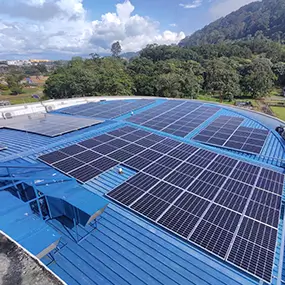
Why is this important?
Goal
We set both interim and long-term goals to steer our actions as a group today and tomorrow towards creating a better, sustainable future for the planet.
Key Targets
- Interim Targets
- To cap Scope 1 and Scope 2 emissions at 2022 baseline level by 2025, inclusive of our growth
- To reduce year-on-year Scope 1 and Scope 2 carbon intensity per patient bed-day
- To be SBTi (Science Based Targets initiative) ready by 2025
- Long-term Target
- To achieve Net-Zero emissions by 2050
2024 Progress
- Our Scope 1 and Scope 2 GHG emissions decreased by 0.7% compared to 2023
- Our Scope 1 and Scope 2 GHG emissions intensity per patient bed-day decreased by 3.2%, despite a 2.5% year-on-year growth in our patient-bed days
- Expanded the number of Scope 3 GHG emissions categories reported to include Category 3: Fuel- and Energy-Related activities
Did You Know?
2.5x
more energy per square foot when comparing hospitals to office buildings.
4.4%
of global greenhouse gas emissions come from the healthcare sector. This is more than the aviation and shipping sectors.
At IHH, we have committed to reduce our emissions every year by bringing down energy usage and using alternative energy sources.

What We’re Doing
In 2024, we took meaningful steps to reduce our environmental footprint. Our efforts focused on cutting emissions, improving energy efficiency, reducing single-use plastics in non-clinical areas, and enhancing waste management across our operations:
- We reduced desflurane use — an anaesthetic gas 2,500 times more potent than CO₂ — by up to 55%.
- In Türkiye, a solar farm launching in 2025 will cover up to 80% of our Türkiye operations' energy needs. Our rooftop solar initiatives are also gaining momentum—with systems already in place at 10 hospitals in Malaysia and at Gleneagles Hong Kong, and six more Malaysian hospitals scheduled for installation by the end of 2025.
- We've also cut single-use plastics in non-clinical areas by over 90% in Hong Kong and Türkiye, following early success in Malaysia and Singapore.
Caring for our planet holds immense importance, as its well-being significantly influences human health and humanity’s future.
Highlights
























